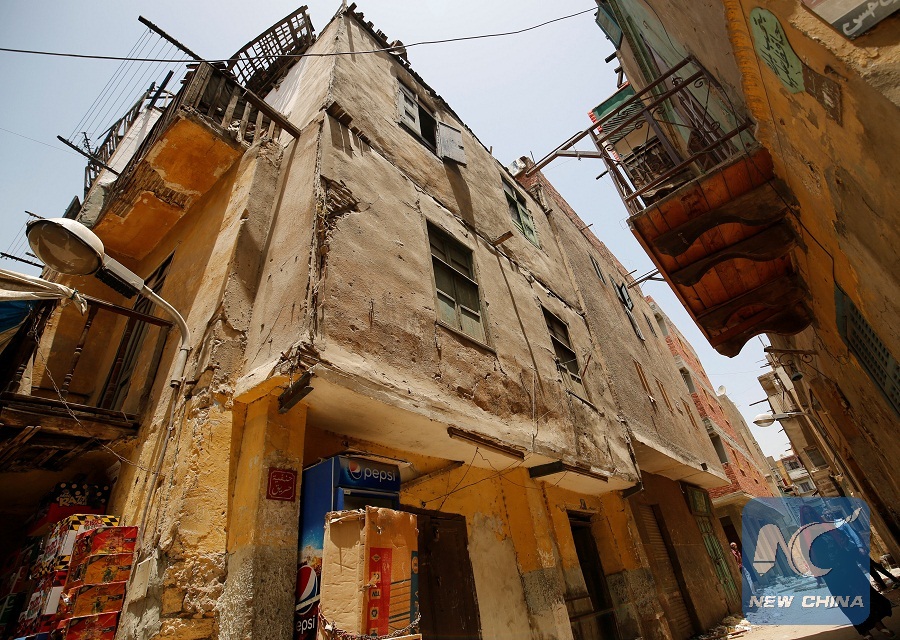
A woman walks between old homes in Al-Assal, one of the oldest slums in the Shubra district of Cairo, Egypt June 1, 2016. (Xinhua/Reuters Photo)
CAIRO, July 19 (Xinhua) -- "It makes me avoid thinking about things that make me sad, which are many things," Abouda, a 32-year-old rickshaw driver, said in Boulak el-Dakrour neighborhood in Giza, referring to his habit of taking hashish.
"I drive rickshaws since they were introduced in Egypt, for about 15 years now, only to be able to afford buying hashish. It is not prevailing only in slums, but everywhere," the man told Xinhua after parking his old rickshaw at one of the streets.
As for Ayman, 28, who works as a delivery man at a restaurant in Giza, said that he used to take a painkiller called Tramadol to feel active at work, but he finally managed to quit due to the physical perils he heard about the drug.
"Before I gave up drugs, I did not feel tired to run from building to building as a delivery man, but when I went to bed at night I slept like a dead body. I used to take Tramadol and Tamol but I quit all of them and I hope all the youth do the same," Ayman narrated.
Abouda and Ayman, one skipped school since a kid and the other never went to school, are among millions of Egyptians out of the country's over 90-million population who took drugs supposedly for fun and for facing life pressures.
Hashish, painkilling tablets such as Tramadol and Tamol and others, heroin and marijuana are the most prevailing types of drugs in Egypt, taken by about 10.4 of the people in the most populous Arab country.
"About 10.4 percent of the population aged from 15 to 65 take drugs, while 2 percent are drug addicts. This means there are about 1.5 million addicts in Egypt, which is an alarming number," Amr Osman, director of Egypt's Drug Control and Addiction Treatment Fund, told Xinhua.
Osman said that hashish is the most popular among drug-takers while Tramadol is number one among addicts and then comes the heroin, stressing that unemployment, poverty and the prevailing slums and street children are among the reasons leading to drugs.
Taking drugs in Egypt started to prevail among minors, which is why the anti-drug fund opened a special section for teenagers in Helwan hospital in Cairo and Mamoura hospital in Alexandria.
Drug dealing is the second top illegal trade in Egypt after arms. Averagely, the police seize around 200 drug-related cases every day. Over the past two days, 419 cases related to drug dealing were registered by the police nationwide.
"Drug-taking is connected with crimes. We made a study at a prison and we found that 80 percent of the crimes were committed under influence of drugs," the official told Xinhua, blaming several Egyptian TV series for playing a negative role by displaying about 12,000 smoking and drug-taking scenes over the past five years.
Osman pointed out that those working as drivers used to constitute to 24 percent of Egyptian drug-takers, but they have been reduced to 14 percent thanks to the awareness media campaigns sponsored by his drug control fund.
Tarek, a drug addict in his early 30s from Cairo's Shubra neighborhood and is currently receiving treatment, said that drugs spread in slums "because their dwellers suffer difficult lives, services, etc."
"Plus, the youth of slums and impoverished neighborhoods like to stay up late, so they take Tramadol as it is a stimulant drug," Tarek told Xinhua, noting he learned that it destroys the kidneys, the digestive system and the brain cells, and so he decided to quit and resorted to treatment.
Originally as a painkiller for tough diseases including cancer, Tramadol used to be available at pharmacies for a cheap price, around one U.S. dollar for a strip, but since abused by drug-takers, it was classified by the health ministry to be restricted to patients with valid prescriptions.
Through corruption, some notorious pharmacies get their official quota of drugs and illegally sell them to users 20 times their prices as a kind of profitable trade, which could subject them to jail.
"In my pharmacy, I avoid getting a drug quota to avoid the official inspection headache. Plus, a pharmacist who should sell Tramadol has to keep a copy of the patient's ID card and the prescription for inspection references," said Medhat, 55, a pharmacist at one of Cairo pharmacies.
"Now drug buyers know where to get them without having to go to pharmacies, as drugs are publicly sold in some slums," the pharmacist told Xinhua, noting Tramadol can even be found in some large, highly supervised state-run pharmacies in downtown Cairo.
Another pharmacist in Giza, Mohamed, 41, said that all drug tablets are considered amphetamines that stimulate the nerve system, "and that is why you can hear about people who stay awake for two or three days."
As for illegal trade of such tablets, the chemist said that the government cannot just shut down the source, because they are vital for some patients in cancer institutes and anti-drug addiction clinics who need strong painkillers such as Morphine and Tramadol.
"The solution is easy. Control the source! Stop providing pharmacies with drugs and make them restricted to hospitals and institutes. This will greatly limit the circulation of drug tablets. The hospitals and institutes will also be inspected, but the whole process will already be limited and controlled," the pharmacist told Xinhua.

